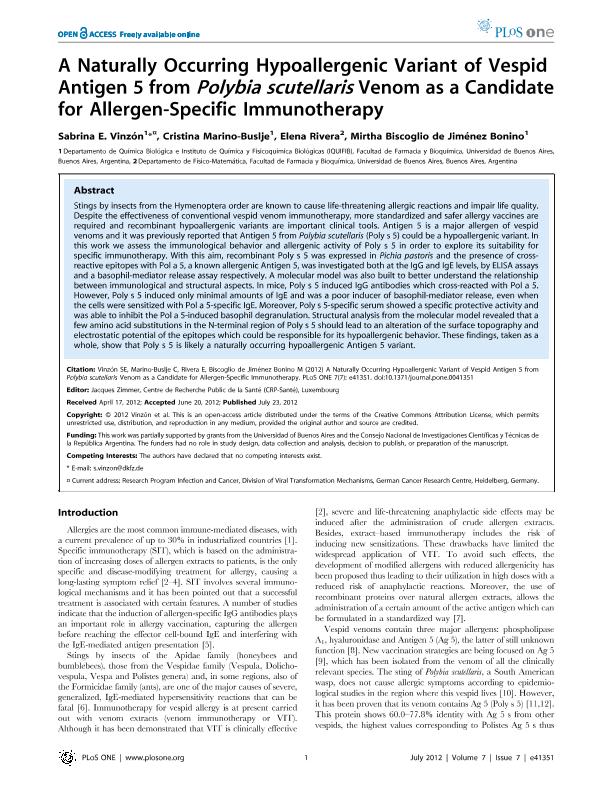Mostrar el registro sencillo del ítem
dc.contributor.author
Vinzon, Sabrina Eugenia

dc.contributor.author
Marino, Cristina Ester

dc.contributor.author
Rivera, Elena

dc.contributor.author
Biscoglio, Mirtha Josefa

dc.date.available
2017-06-13T21:11:41Z
dc.date.issued
2012-07
dc.identifier.citation
Vinzon, Sabrina Eugenia; Marino, Cristina Ester; Rivera, Elena; Biscoglio, Mirtha Josefa; A Naturally Occurring Hypoallergenic Variant of Vespid Antigen 5 from Polybia scutellaris Venom as a Candidate for Allergen-Specific Immunotherapy; Public Library Of Science; Plos One; 7; 7; 7-2012; 1-8; e41351
dc.identifier.issn
1932-6203
dc.identifier.uri
http://hdl.handle.net/11336/18152
dc.description.abstract
Stings by insects from the Hymenoptera order are known to cause life-threatening allergic reactions and impair life quality. Despite the effectiveness of conventional vespid venom immunotherapy, more standardized and safer allergy vaccines are required and recombinant hypoallergenic variants are important clinical tools. Antigen 5 is a major allergen of vespid venoms and it was previously reported that Antigen 5 from Polybia scutellaris (Poly s 5) could be a hypoallergenic variant. In this work we assess the immunological behavior and allergenic activity of Poly s 5 in order to explore its suitability for specific immunotherapy. With this aim, recombinant Poly s 5 was expressed in Pichia pastoris and the presence of cross-reactive epitopes with Pol a 5, a known allergenic Antigen 5, was investigated both at the IgG and IgE levels, by ELISA assays and a basophil-mediator release assay respectively. A molecular model was also built to better understand the relationship between immunological and structural aspects. In mice, Poly s 5 induced IgG antibodies which cross-reacted with Pol a 5. However, Poly s 5 induced only minimal amounts of IgE and was a poor inducer of basophil-mediator release, even when the cells were sensitized with Pol a 5-specific IgE. Moreover, Poly s 5-specific serum showed a specific protective activity and was able to inhibit the Pol a 5-induced basophil degranulation. Structural analysis from the molecular model revealed that a few amino acid substitutions in the N-terminal region of Poly s 5 should lead to an alteration of the surface topography and electrostatic potential of the epitopes which could be responsible for its hypoallergenic behavior. These findings, taken as a whole, show that Poly s 5 is likely a naturally occurring hypoallergenic Antigen 5 variant.
dc.format
application/pdf
dc.language.iso
eng
dc.publisher
Public Library Of Science

dc.rights
info:eu-repo/semantics/openAccess
dc.rights.uri
https://creativecommons.org/licenses/by/2.5/ar/
dc.subject
Antigen 5
dc.subject
Polybia Scutellaris
dc.subject
Immunotherapy
dc.subject
Hypoallergenic Variant
dc.subject.classification
Bioquímica y Biología Molecular

dc.subject.classification
Ciencias Biológicas

dc.subject.classification
CIENCIAS NATURALES Y EXACTAS

dc.title
A Naturally Occurring Hypoallergenic Variant of Vespid Antigen 5 from Polybia scutellaris Venom as a Candidate for Allergen-Specific Immunotherapy
dc.type
info:eu-repo/semantics/article
dc.type
info:ar-repo/semantics/artículo
dc.type
info:eu-repo/semantics/publishedVersion
dc.date.updated
2017-06-13T14:13:28Z
dc.journal.volume
7
dc.journal.number
7
dc.journal.pagination
1-8; e41351
dc.journal.pais
Estados Unidos

dc.description.fil
Fil: Vinzon, Sabrina Eugenia. Consejo Nacional de Investigaciones Científicas y Técnicas. Oficina de Coordinación Administrativa Houssay. Instituto de Química y Físico-química Biológicas "prof. Alejandro C. Paladini". Universidad de Buenos Aires. Facultad de Farmacia y Bioquímica. Instituto de Química y Físico-química Biológicas; Argentina
dc.description.fil
Fil: Marino, Cristina Ester. Consejo Nacional de Investigaciones Científicas y Técnicas. Oficina de Coordinación Administrativa Houssay. Instituto de Química y Físico-química Biológicas "prof. Alejandro C. Paladini". Universidad de Buenos Aires. Facultad de Farmacia y Bioquímica. Instituto de Química y Físico-química Biológicas; Argentina. Consejo Nacional de Investigaciones Científicas y Técnicas. Oficina de Coordinación Administrativa Parque Centenario. Instituto de Investigaciones Bioquímicas de Buenos Aires. Fundación Instituto Leloir. Instituto de Investigaciones Bioquímicas de Buenos Aires; Argentina
dc.description.fil
Fil: Rivera, Elena. Universidad de Buenos Aires. Facultad de Farmacia y Bioquímica. Departamento de Físico Matemática; Argentina
dc.description.fil
Fil: Biscoglio, Mirtha Josefa. Consejo Nacional de Investigaciones Científicas y Técnicas. Oficina de Coordinación Administrativa Houssay. Instituto de Química y Físico-química Biológicas "prof. Alejandro C. Paladini". Universidad de Buenos Aires. Facultad de Farmacia y Bioquímica. Instituto de Química y Físico-química Biológicas; Argentina
dc.journal.title
Plos One

dc.relation.alternativeid
info:eu-repo/semantics/altIdentifier/url/http://journals.plos.org/plosone/article?id=10.1371/journal.pone.0041351
dc.relation.alternativeid
info:eu-repo/semantics/altIdentifier/doi/http://dx.doi.org/10.1371/journal.pone.0041351
Archivos asociados
